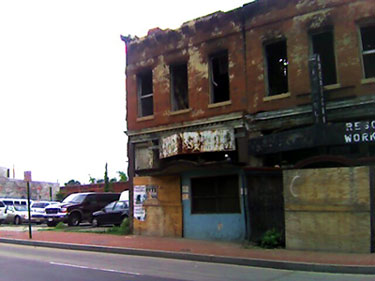
WASHINGTON (FinalCall.com) – On the boarded up corner of Good Hope Road and Martin Luther King Ave. in the poorest section of the city, protesters gathered July 6 to let the city know that video lottery terminals, a.k.a. slot machines, are unwanted in their community.
“They’ll just create chaos and more crime,” 16-year-old Montray Brown told The Final Call. He was part of about 15 young people who came to voice their opposition. “People aren’t going to sit here and watch people come to our community and win money with slots. They’re going to get robbed. The crime rate is going up and there’ll be more murders. People here don’t have money to gamble.”
The citizens are protesting the circulation of petitions around the city to place the “Video Lottery Terminal Initiative of 2006” before voters on the November ballot. Barry Jerrels proposed the initiative, which aims to expand the lottery by allowing Video Lottery Terminals (VLTs), which are very similar to slot machines in the District of Columbia, and establish the initial VLT facility at a small site in the Anacostia section of Ward 8 targeted for redevelopment.
“Ward 8 has no grocery store. Ward 8 has no sit-down restaurant,” pointed out Anthony Muhammad, chair of the 8A Advisory Neighborhood Commission that represents the concerns of citizens in Ward 8. “Slots won’t help, they will only destroy. We don’t need them and we don’t want them.”
The initiative has to collect 19,000 signatures on their petitions for it to be placed on the November ballot. Activists are concerned that petitioners will use fraudulent means to secure the 19,000 before the July 10 deadline.
At-large City Councilmember Carole Schwartz read an email she received from a resident who was approached to sign a petition. The email explained that the resident was approached to sign a petition against legalized gambling. Upon reading the petition–which most people don’t do–the resident found out that the petition was actually for placing slots on the November ballot. She urged residents to call the Board of Elections and Ethics to report such occurrences.
“I feel so strongly about how this will negatively impact a community on the rise. People become addicted to gambling. People put money in slot machines to make rich people richer,” Ms. Schwartz contended. “This is a destructive thing. These petitions are misleading at best.”
Resident after resident spoke on the horror of having slots in a community that needs so much more than another form of gambling. Activists have recently been fighting the sale of drug paraphernalia in convenience and carry-out stores, gas stations and liquor stores.
“We’re fighting everything negative that they just want to dump in this community. Why bring it to the people with the least amount of disposable income?” asked Mr. Muhammad. “They promise the money will go toward better schools. They said that about the lottery and we’re still waiting for that to happen,” he added.
After July 10, the activists will know whether their fight continues to the November ballot. They also have a case in the Court of Appeals on the validity of placing the initiative on a petition.












